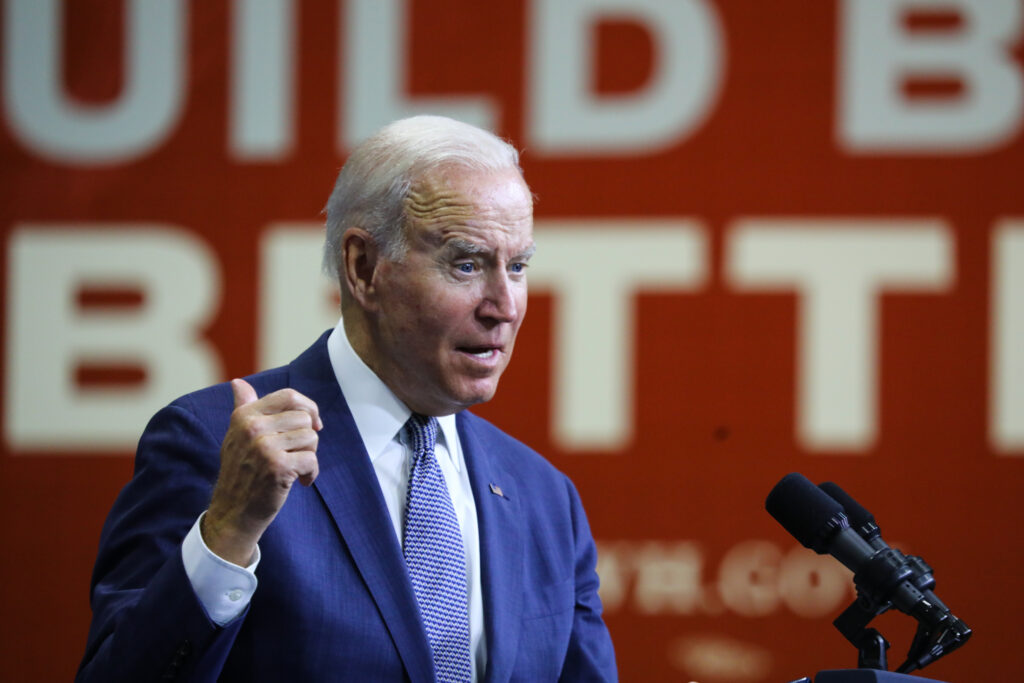President Barack Obama is unveiling his deficit plans today. They are short-term, inherently political decisions (as opposed to long-term policy solutions), once again pairing temporary tax and spending cuts with permanent tax hikes. The plan is unlikely to pass muster with many on Capitol Hill.
It’s worth paying attention, though, to what Obama’s willing to do and unwilling to do when it comes to touching Medicare. The vast majority of the proposal’s cuts are simply phony–a calculation based on ending the wars in Iraq and Afghanistan and lo and behold coming up with over a trillion dollars to play with. But the Medicare cuts are less fictional, including, according to liberal writer Jonathan Cohn, about $250 billion in real cuts:
The biggest, most recognizable changes (at least to those of us who follow health policy) are larger drug rebates for the Medicare program, which is basically demanding that the pharmaceutical industry reduce what the government pays for prescription drugs, and higher Part B premiums for wealthier seniors. Those higher premiums would not start until 2017.
Also of note are increases in cost-sharing for home health care and some Part B premiums. This is actually something conservatives should like, at least in theory, since it’s arguably a version of what they call “consumer-directed care,” albeit in a very small dose. Basically, seniors would have to pay slightly higher out-of-pocket costs for home health care and Part B services, plus they’d have to pay a surcharge on their premiums if their Medigap policies have “first-dollar” coverage (in other words, fi [sic] their Medigap policies don’t have any cost-sharing). The hope is that exposing seniors to higher out-of-pocket costs would make them a little more wary of using services that might not be necessary.
Cohn is happy Obama didn’t propose something truly severe, like raising the age of access to Medicare from 65 to 67 (that being a liberal bridge too far). But he’s less than happy about means-testing the program–presumably for policy reasons, though Hill Democrats are buzzing with discontent about this aspect, since they’d been planning to hit Republicans next year on the means-testing front.
Context is important here considering the political games Obama’s party has played with the Medicare program. As president he’s now proposed in excess of $750 billion in cuts to the program, nearly all through the further restriction of payments to doctors and providers. The presumption among his supporters is that this squeeze can happen without dramatically decreasing the quality or access to care for Medicare patients. But this is an entirely temporary “fix,” unconnected to any long-term solutions. As Tevi Troy writes in the latest edition of Commentary, Mediscare is the name of the game:
Recent statements and actions by Pelosi and other Democrats reveal that the Democratic Party believes that making political use of Medicare is more important than ensuring the viability of the program itself. Recent history shows that the hunger to be simultaneously on offense and defense–fighting aggressively against efforts at reforming Medicare in order to save it–may well succeed in undermining any prospects for meaningful reform and further poison the relations between the two parties.
Troy does a good job of describing the reality of the political moment. It will take a new attitude from someone new in the White House, Democrat or Republican, to change things. Until then, they’re just playing shell games with nonexistent money, and expecting more and more doctors to work for free.
— Benjamin Domenech
IN THIS ISSUE:
SHORTER FOURTH CIRCUIT: WHOOPS
Heartland Institute Senior Fellow Maureen Martin found a rather embarrassing factual error in the Fourth Circuit’s recent ruling against Virginia’s individual mandate lawsuit.
Virginia had enacted a state statute – the Virginia Health Care Freedom Act (VHCFA) – declaring the individual mandate contained in the Obamacare bill did not apply to its citizens. Virginia then filed a lawsuit alleging the individual mandate violates the Commerce Clause of the United States because the federal government lacks the constitutional power to require individual citizens to purchase health insurance or pay a penalty.
The federal appellate court held last week it could not reach the merits of this constitutional claim because Virginia lacked standing to assert it. The court’s reasoning was the federal individual mandate was already a law when the Virginia statute was passed, so the state statute amounted to nothing more than a political attack on it – a statement of “generalized grievances” about it.
The problem here is the court is wrong on the timing.
The court says: “Virginia filed this action on March 23, 2010, the same day that the President signed the Affordable Care Act into law. The Governor of Virginia did not sign the VHCFA into law until the next day.” This is important, the court asserted, because “the only apparent function of the VHCFA is to declare Virginia’s opposition to a federal insurance mandate. And, in fact, the timing of the VHCFA, along with the statements accompanying its passage, make clear that Virginia officials enacted the statute for precisely this declaratory purpose.”
In reality, the Virginia law was signed by Gov. McDonnell and codified on March 10, 2010. The “ceremonial” signing was held on March 24, 2010. So rather than a Virginia law seeking to invalidate an existing federal law, it was the other way around. It was a federal law seeking to invalidate an existing Virginia law.
As Martin notes, the court’s factual error concerned a point that wasn’t even raised by either side – the timing of Virginia’s health care freedom act. The court did its own research and got it wrong.
SOURCE: The Heartland Institute
Oklahoma has requested an MLR waiver with the endorsement of its entire Congressional delegation.
Doak requested an adjustment from the U.S. Department of Health and Human Services to new minimum Medical Loss Ratio (MLR) requirements for individual health insurance policies issued in Oklahoma from 2011 through the year 2014.
Doak has requested that the state be permitted to phase-in those MLR requirements between now and 2014. The commissioner recommends a phase-in of 65 percent for this year, 70 percent in 2012 and 75 percent by 2013.
His letter to U.S. Secretary of Health and Human Services Kathleen Sebelius was accompanied by endorsements from the Independent Insurance Agents of Oklahoma and the Oklahoma State Association of Health Underwriters.
The commissioner believes that phasing-in the MLR requirements over a period of years would preserve competition and consumer choice in Oklahoma by maintaining the viability of smaller insurers and local agents.
For more on this topic, read this policy paper from Oklahoma Sen. Tom Coburn’s office on the MLR issue.
SOURCE: Insurance Journal
THE HOSPITALS AS HEALTH INSURER
Sarah Kliff reports on the latest steps in Massachusetts:
Right now, health insurers and hospitals are separate entities. This is something different: a hospital selling coverage, with the restriction that you only seek care at its locations. The hospital chain is Steward, a Massachusetts-based business that has been buying up community-based hospitals for more than a year now. And the gamble it made was rolling out a health insurance plan that almost-exclusively serves its hospitals (there are a few exceptions). The plan, administered through Tenet Health Plans, is called Steward Community Choice.
The Community Choice plan, as outlined Friday, is targeted at small businesses in Massachusetts. It offers them a trade-off. Premiums will be 20 to 30 percent less than what other Massachusetts insurers charge. In return, subscribers will by-and-large be limited to treatment at Steward locations (there are some exceptions to this, helpfully outlined in this report from WBUR’s Martha Bebinger).
In a conversation Friday, Steward CEO Ralph de la Torre explained how Massachusetts’ health reforms played into his decision to pursue such a plan. “In Massachusetts, we have the advantage or disadvantage of having begun health reform earlier than the rest of the United States,” he said. “If you want to get everyone covered, how do you pay for it? We’ve grappled with that in Massachusetts and looked for different solutions. This is one of them.”
There are all sorts of market motivations for this sort of thing, but I’m dubious as to how it will play among Massachusetts consumers. Past models along these lines have seemed promising to certain corners, but they’ve nearly all failed. Consumers like to be able to shop and pick from a range of choices, not be crammed into a box where they have little control.
SOURCE: Washington Post
COST-SAVINGS THROUGH MAKE-WORK
One element of Obama’s health care law we criticized regularly during its debate was the addition of over-the-counter drugs to the list of purchases not allowed for HSA and FSA users, reportedly for some form of cost-savings (but really because of political opposition to HSAs/FSAs). Now according to Bloomberg Government (note: paywall), exactly what we expected to happen is, well, happening:
Doctors at East Louisville Pediatrics PSC in Kentucky say they’re writing as many as 50 prescriptions a day for drugs such as Bayer AG’s aspirin and Pfizer Inc.’s Advil that don’t need a physician’s nod to be purchased off pharmacy shelves.
The trend, triggered by the 2010 health-care law, affects more than 20 million Americans with flexible spending or health savings accounts that let them use pretax dollars for medical needs. A U.S. rule that took effect Jan. 1 taxes purchases of over-the-counter drugs except for insulin unless the patient has a prescription, generating $5 billion through 2019, according to the congressional Joint Committee on Taxation.
Doctors, pharmacists, insurers and drug companies say while it may generate money to help expand coverage for the uninsured, the measure is driving up medical costs and creating unnecessary work. They want it repealed, expecting demand to surge at year’s end, when people have to use up balances in the accounts.
“It’s a complete waste of time,” said Conrad Flick, one of five physicians at Family Medical Associates of Raleigh in North Carolina, in a telephone interview. In many cases, he said, he’ll talk with patients by phone to determine why they want the drug before he feels comfortable writing the prescription. “So I’m spending an extra half-hour or hour of my day doing things that I don’t get paid for,” he said.
Administrative costs from the new provision are growing, said Diane Myers, administrator for the East Louisville practice that has eight doctors and two nurse practitioners who write prescriptions. “I bet we’re spending a minimum of 10 hours a week on these things,” she said.
SOURCE: Bloomberg Government
FRIDAY HEARING ON DRUG SHORTAGES
A hearing in the House Energy and Commerce Committee on Friday will deal with the rise in drug shortages, particularly for cancer drugs. Richard Epstein has a long essay on the topic of price controls and drug shortages here, a longer version of a piece he wrote in a recent edition of Health Care News. It’s a particularly thoughtful piece, and worth your time.





